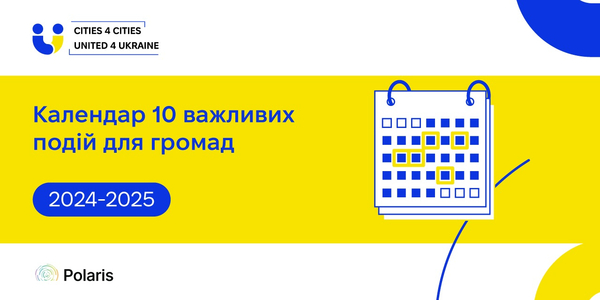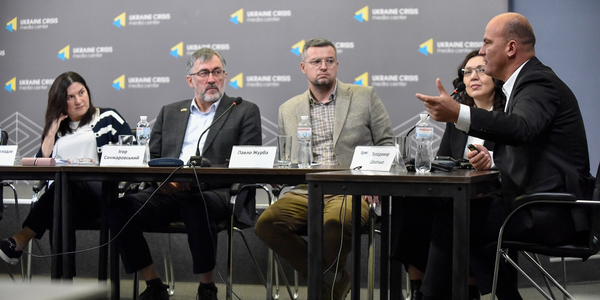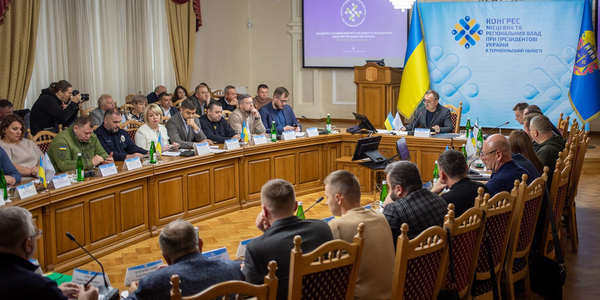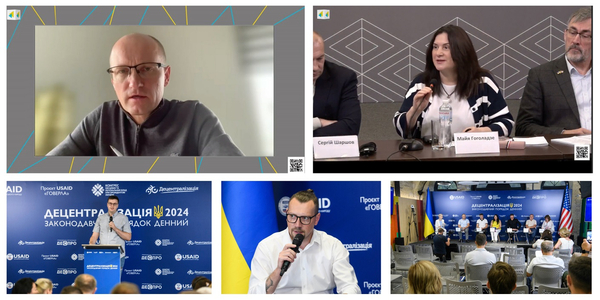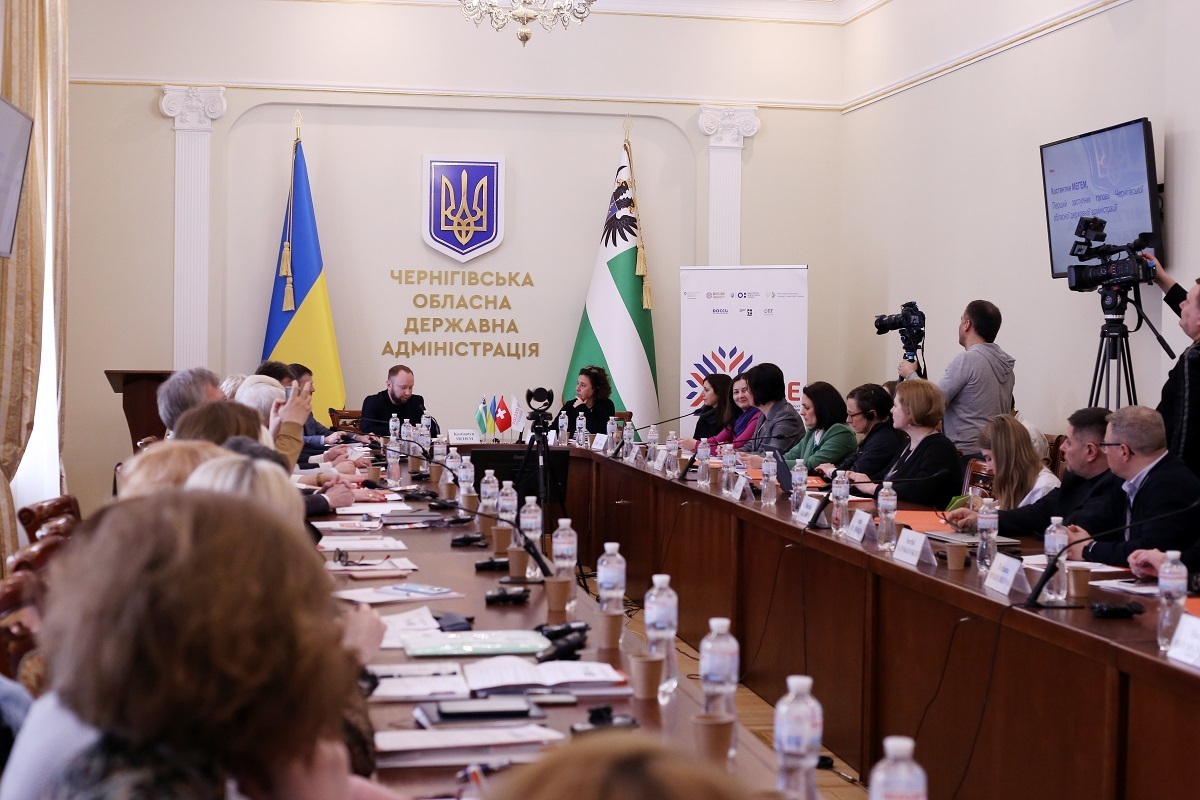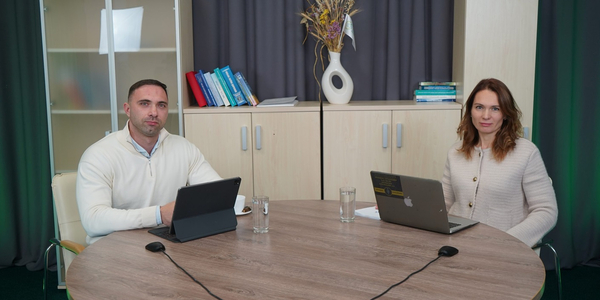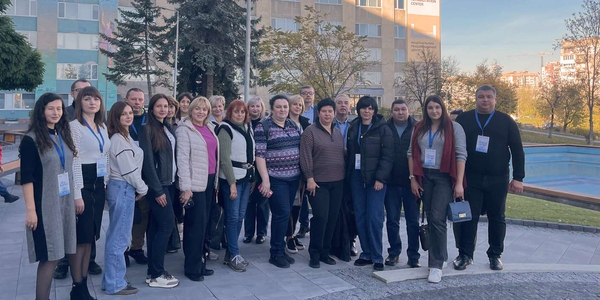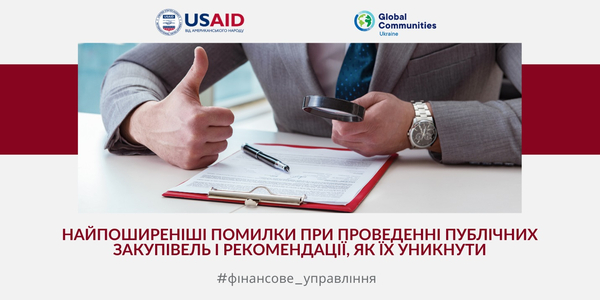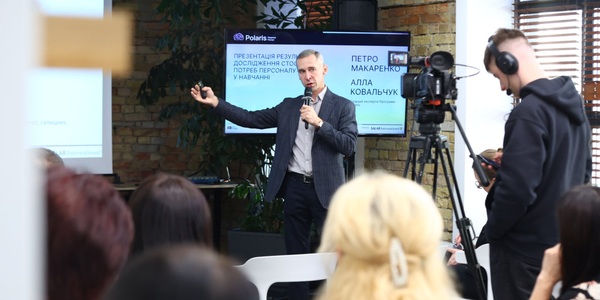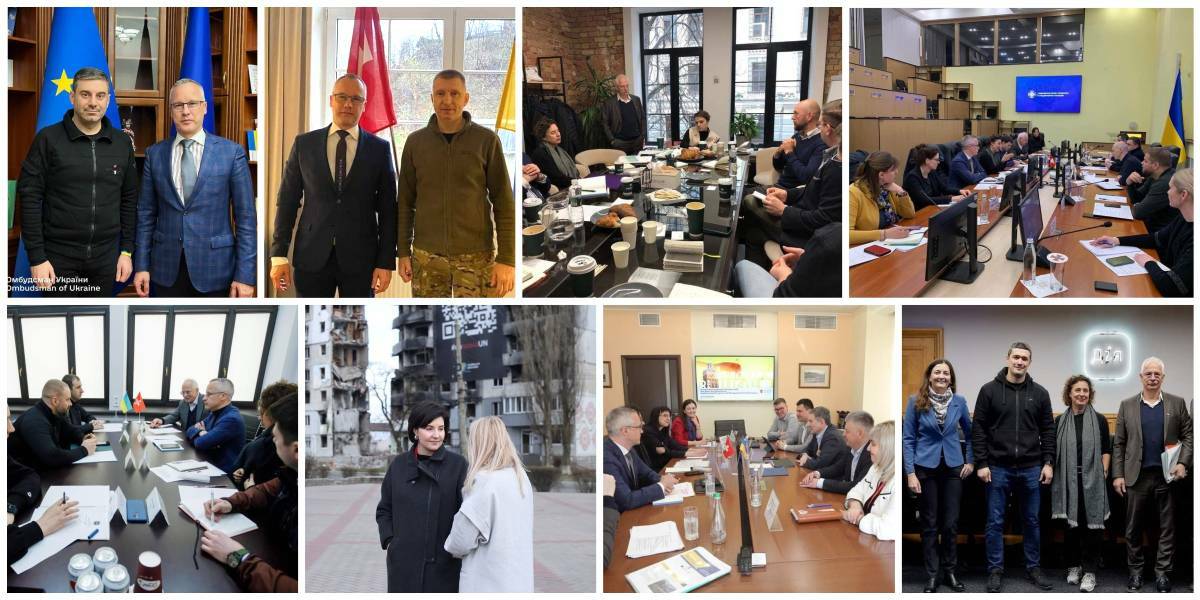
Since the restoration of Ukraine’s independence, Switzerland has been a reliable friend and partner of the Ukrainian people. In fact, all these years, Switzerland has been helping Ukraine implement structural reforms aimed at raising the standard of living and developing human capital, ensuring the quality and availability of public services and the economic development of municipalities, each of which is an integral part of greater Ukraine. And in the most difficult time for the Ukrainian people — the time of Russia’s large-scale armed invasion of Ukraine — Switzerland responds to most of its urgent needs.
At the end of March, a delegation of the Swiss Confederation paid an official visit to Ukraine, including Ambassador Andrea Studer, Assistant Director General of the Swiss Agency for Development and Cooperation (SDC) and Head of the Middle East and North Africa (MENA) — Europe Division, and Ambassador Simon Geissbühler, Deputy State Secretary, Head of the Peace and Human Rights Division of the Federal Department of Foreign Affairs of Switzerland. The delegation visited a number of regions and municipalities of Ukraine and held a series of important meetings regarding further support for our country in wartime.
Switzerland will provide support to the regional coordinators of the Commissioner for Missing Persons
As part of the visit, Ambassador Simon Geissbühler, Head of the Peace and Human Rights Division of the Federal Department of Foreign Affairs of Switzerland, held a meeting with Oleh Kotenko, Commissioner for Persons Gone Missing under Special Circumstances. The parties discussed the matter of Switzerland’s provision of assistance for the proper functioning of the Commissioner’s network of regional coordinators who search for missing persons. Ambassador Geissbühler reaffirmed Switzerland’s commitment to supporting the Commissioner’s mandate in other areas as well.
Oleh Kotenko extended his gratitude to the Swiss partners for their valuable assistance, noting that “this support not only speeds up search, but also gives hope to the families of those missing!”.
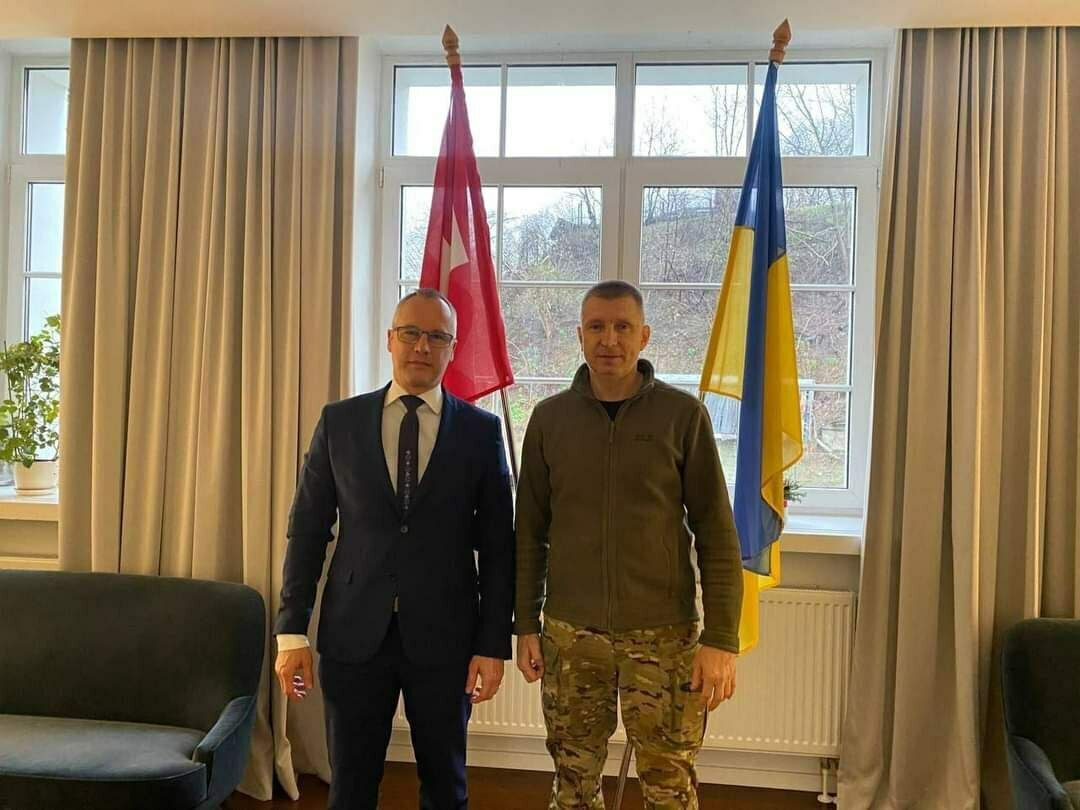
Commissioner for Missing Persons Oleh Kotenko and Ambassador Simon Geissbühler
Assistance to rescue teams
At a meeting with the highest officials of the State Emergency Service of Ukraine, the Swiss government delegation addressed the needs of professional rescue teams working in dangerous conditions. It is, first and foremost, about saving people’s lives and mitigating the consequences of war. Incidentally, as of April 5, units of the State Emergency Service of Ukraine surveyed almost 82,000 hectares of territory and neutralised more than 340,000 explosive ordnance. There is still a total of 174,000 sq. km. of potentially dangerous territories left — 30% of the total area of the state. Therefore, the support of friendly Switzerland in this direction will contribute to clearing these territories and transforming them into a safe environment for people faster.
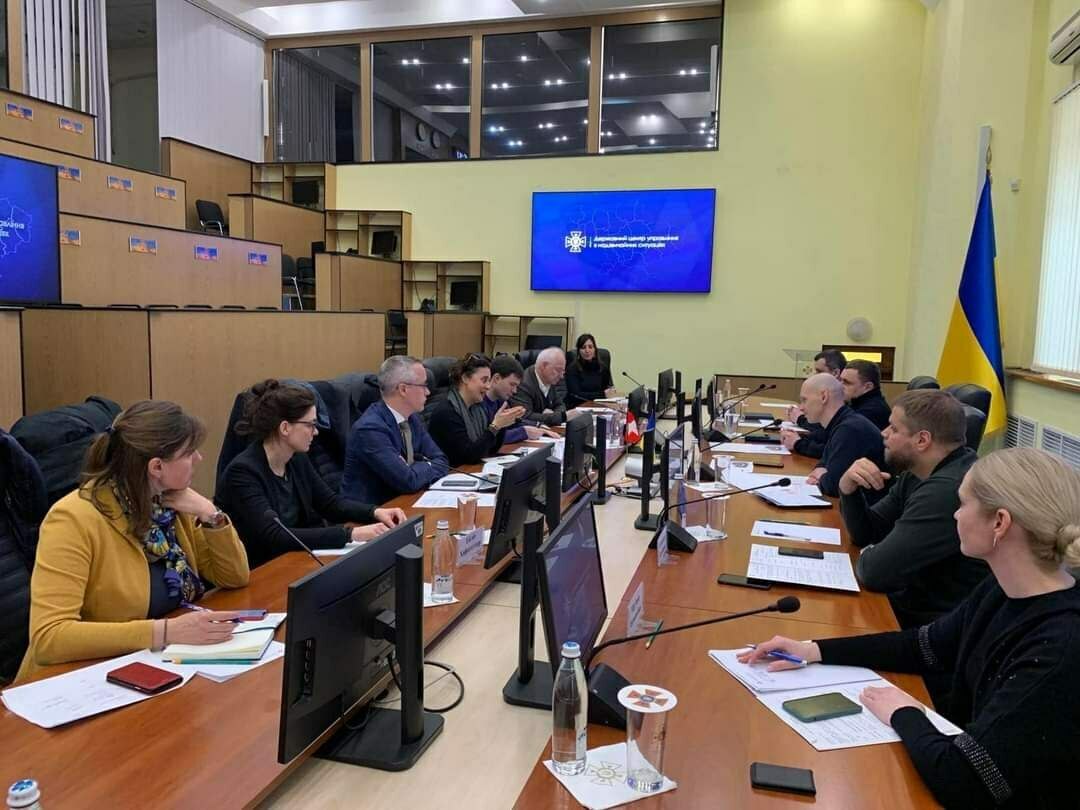
Meeting with the highest officials of the State Service of Ukraine
On the guard of human rights: further cooperation and information exchange
Ambassador Geissbühler also held a meeting with Dmytro Lubinets, Commissioner for Human Rights of the Verkhovna Rada of Ukraine.
It should be noted that Switzerland has been continuously providing humanitarian aid to Ukrainian citizens during the war. The total value of the aid already provided by Switzerland to Ukraine since the beginning of the full-scale Russian invasion in February 2022 is more than 270 million Swiss francs. In addition to the matter of humanitarian support, the parties also discussed the violation of the rights of Ukrainians detained by the Russian Federation; forced deportation of Ukrainian children; the rights of internally displaced persons.
During the meeting, Dmytro Lubinets drew the attention of Ambassador Geissbühler to the Russian Federation’s violation of the Geneva Convention relative to the Treatment of Prisoners of War and the denial of access to representatives of international organisations to the places of detention of the captured defenders of Ukraine. The Commissioner for Human Rights also noted that all war crimes committed by “the aggressor state on our land deserve a fair punishment, so there is a need to create a special tribunal for crimes of aggression by the Russian Federation against Ukraine.”
Following the meeting, the parties agreed on information exchange and further cooperation.
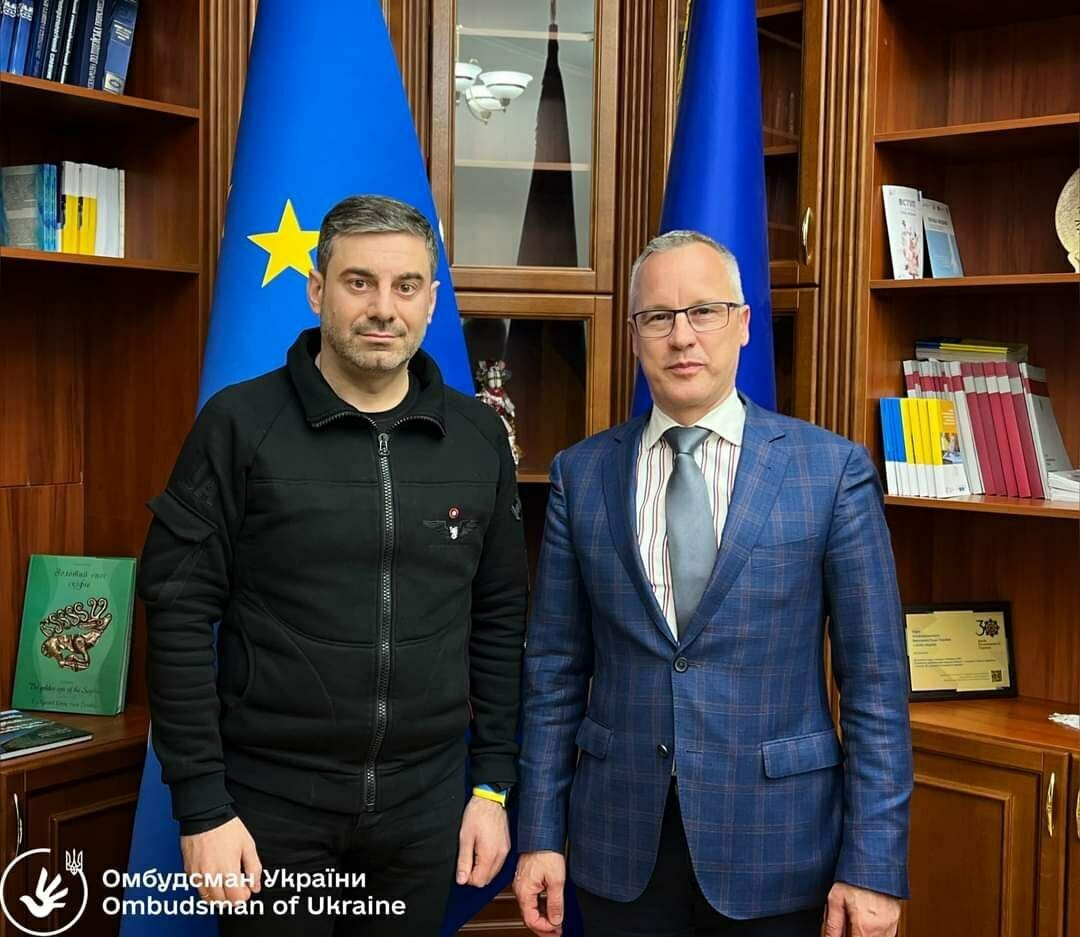
Human Rights Commissioner of the Supreme Council of Ukraine Dmytro Lubinets and Ambassador Simon Geissbühler
Borodianka municipality
Switzerland is supporting reconstruction projects in the Borodianka municipality, which suffered significant destruction of housing and critical infrastructure during the war. Therefore, as part of her visit to Ukraine, Ambassador Andrea Studer, Assistant Director General of the Swiss Agency for Development and Cooperation (SDC), visited the municipality, held a number of meetings with local and regional authorities and learned about the current reconstruction projects being implemented with the support of the Swiss Confederation. In particular, she spoke with the representatives of a local apartment building co-owners association, where a project to restore the water supply and drainage system was implemented, as well as with the team of the Inclusive Resource Centre of the Borodianka municipality, where the Swiss Department of Humanitarian Aid in cooperation with the Swiss-Ukrainian project “Decentralisation for Improved Democratic Education” (DECIDE) and the local business community supported the repair and equipment of the ground floor of the Centre and the bomb shelter. The Centre provides educational and rehabilitation services for more than 200 children with special educational needs. The number of children who need the services of the Centre is increasing every day.
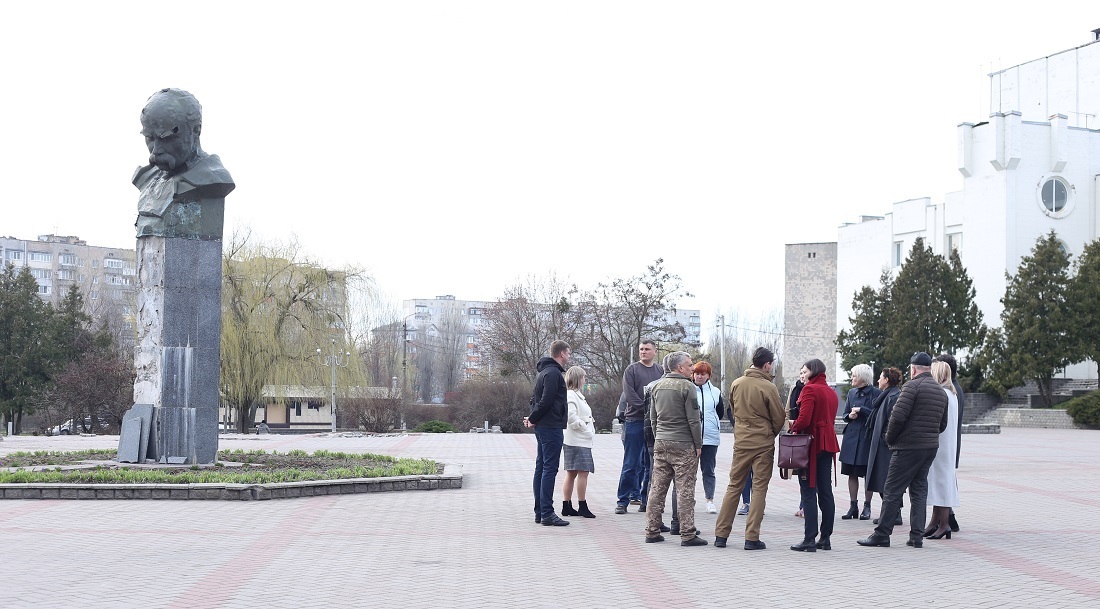
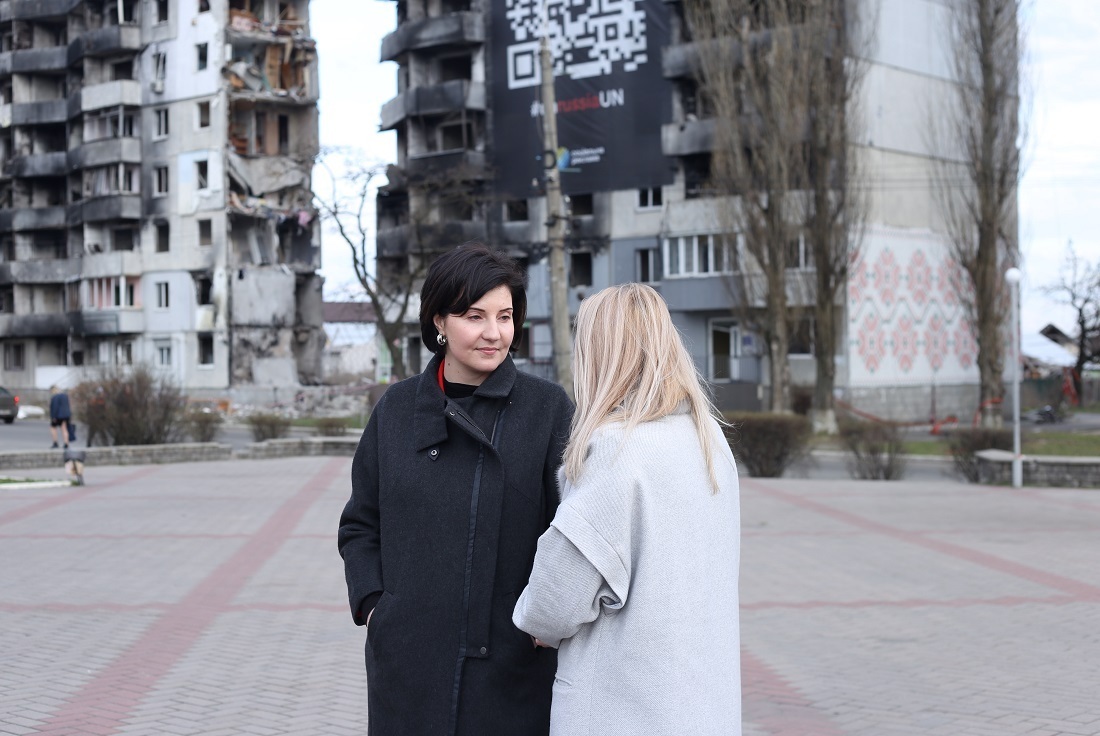
Visit to Borodianka municipality
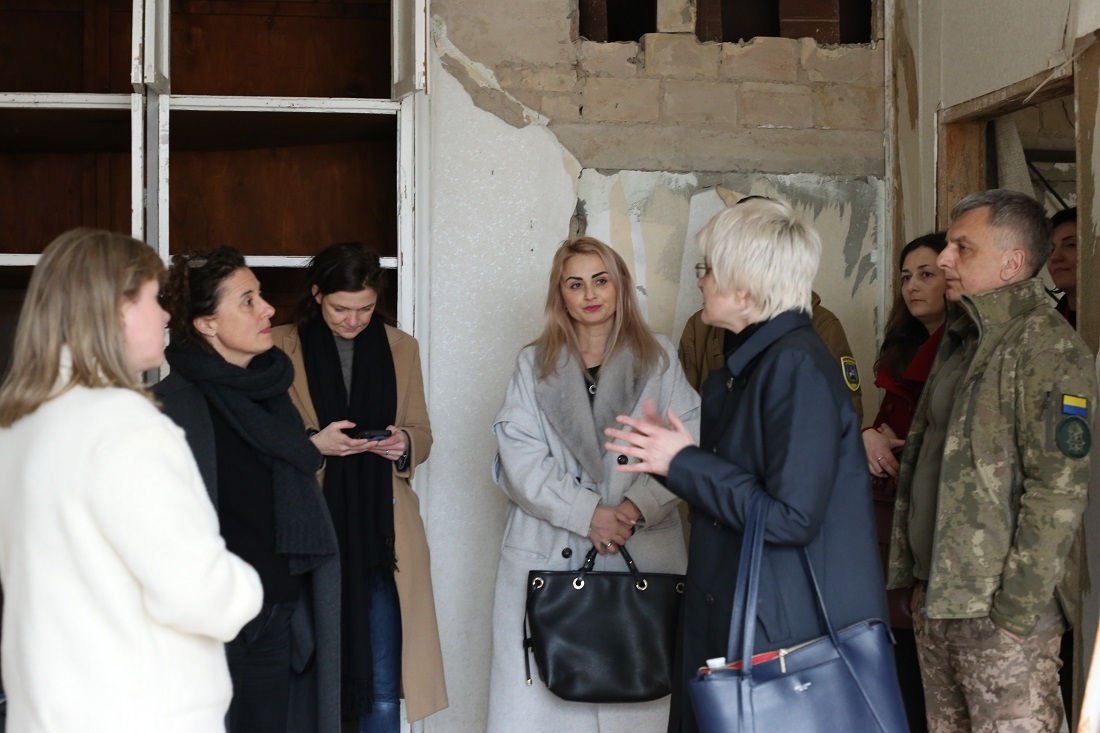
Switzerland intends to participate in the restoration of educational facilities in the Chernihiv region and Borodianka municipality
Municipalities of the Chernihiv region
The Swiss delegation’s visit to Ukraine coincided with the launch of the Swiss-Ukrainian project “Decentralisation for Improved Democratic Education” (DECIDE) in the Chernihiv region. It became the fifth partner region of DECIDE.
The municipalities of Berezna, Korop, Mena and Chernihiv became the winners of the competitive selection. All of them will receive expert support in the development and implementation of educational strategies and, if necessary, municipal development strategies. In addition, each municipality will receive UAH 1,000,000 for the implementation of student social projects. Within the scope of cooperation, they also plan to provide expert support on issues of education management for all municipalities of the Chernihiv region.
“The multi-vector nature of the project involves strengthening the potential of municipalities in the development and practical implementation of decentralised education management models, strategies for the restoration and development of education, etc., as well as their implementation plans. It has a strong emphasis on the professional development of officials of local self-government of municipalities in general and officials of structural units responsible for education in a given municipality in particular. The project also focuses on improving the methods and tools of civil society development and public engagement in education management,” said Valentyna Poltorak, DECIDE Project Manager.
According to the representative of the project, DECIDE will contribute to the development of democratic, transparent and accountable management of education in municipalities, strengthening the role of schools in public life, inclusive public engagement in decision-making in municipalities. In addition, it will contribute to the initiation of participation mechanisms, the involvement of students, teachers, school principals, officials, parents, media, etc. in decision-making in municipalities, as well as the creation of an effective legal framework for the decentralisation of education management and professional development.
Furthermore, DECIDE will generally be implemented at the national level. The project is piloted in 20 municipalities and 5 regions, namely Chernihiv, Ivano-Frankivsk, Luhansk, Poltava and Odesa.
Visit of the Swiss delegation to Chernihiv region
More digital reforms to follow
Another important meeting took place in the Ministry for Digital Transformation. Ambassador Andrea Studer, Assistant General Director of SDC, and Head of the Middle East and North Africa (MENA) — Europe Division, and Europe and Mykhailo Fedorov, Vice Prime Minister for Innovation, Development of Education, Science and Technology — Minister for Digital Transformation of Ukraine, discussed the digitalisation of Ukraine. Switzerland provides assistance to Ukraine in this area as well.
“Ukraine is digitising at a breakneck pace. What took other countries decades, we implemented in 3 years. However, such success would not have been possible without our partners, the Swiss Government and, in particular, the Swiss Agency for Development and Cooperation (SDC). They are helping us build a digital Ukraine with the help of the EGAP Programme and the Eastern Europe Fund,” said Mr Fedorov.
According to the Minister, the support of SDC contributed to the creation of the foundation of a digital state in Ukraine — the Diia application and portal; launching e-Maliatko services and automatic registration as an Individual Entrepreneur; developing the Diia.Digital Education platform.
Ms Studer also praised the effective cooperation in this direction and emphasised the importance of not leaving out the most vulnerable groups, whose numbers are, unfortunately, going up in the conditions of war. SDC is guided by Leave No One Behind (LNOB), one of the key principles to overcoming poverty, inequality and various forms of discrimination.
The parties agreed to deepen cooperation and work together on the digital transformation of education in Ukraine. As part of DECIDE, the updated electronic education management system — AIKOM — will be launched shortly to optimise reporting, digitise educational statistics and contribute to the development of the analytical and forecasting system, which is a priority for the reconstruction of Ukraine. In addition, the DIIA application will soon feature the “Parents’ Cabinet”.
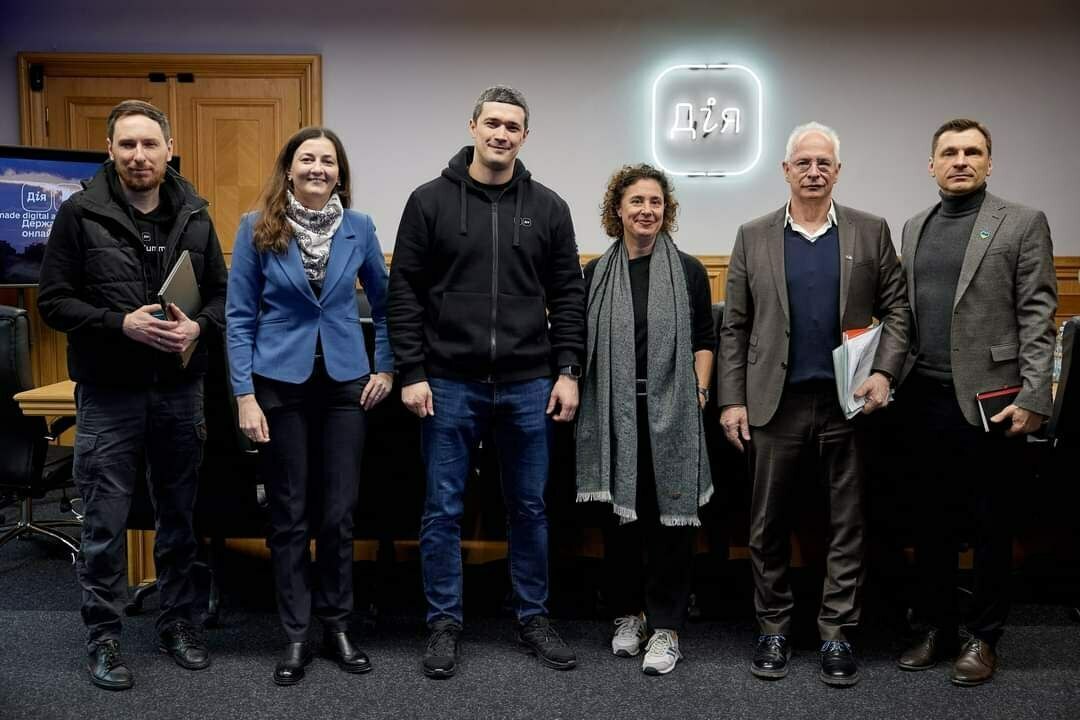
Swiss delegation at a meeting at the Ministry for Digital Transformation of Ukraine
Development of regions and municipalities
In the Vinnytsia region, the Swiss government delegation held a meeting with the heads of regional development agencies of the Vinnytsia, Sumy, Ternopil and Khmelnytskyi regions. Ukraine’s Cohesion and Regional Development (UCORD), the project implemented with the support of Switzerland by NIRAS Sweden AB, will provide institutional support to agencies of these regions for coordinated recovery and robust regional development.
It is worth noting that in addition to the implementation of state regional policy, regional development agencies are also essential for the restoration of the territories of Ukraine. Since the agencies are relatively new institutions, they need comprehensive support for their establishment and effective operation. That is why the Swiss UCORD project started working with the first four regional development agencies. The formation of powerful professional teams of agencies and their proper technical support will boost the investment, export and entrepreneurial potential of the territories, the implementation of projects aimed at strengthening the economics of the territories, their reconstruction and development in the regions. This contribution by Switzerland signals its intentions to continue supporting structural reforms in Ukraine.
Vinnytsia municipality
The Vinnytsia City Council also hosted the government delegation. For more than 16 years, Vinnytsia has been developing a partnership with Switzerland, and the municipality has become innovative with its active support.
At the meeting, Serhii Morhunov, Mayor of Vinnytsia presented recovery projects that are important for the municipality.
“We are open to cooperation with both government organisations and private investors. And it is nice when our guests consider Vinnytsia an innovative municipality. The Swiss Confederation has also undoubtedly contributed to this. And even in the most difficult time for our country, we continue to work together. We are expecting a shipment of trams from Zurich soon. I am grateful to international partners for their tangible support of Vinnytsia and solidarity with Ukraine,” said Serhii Morhunov.
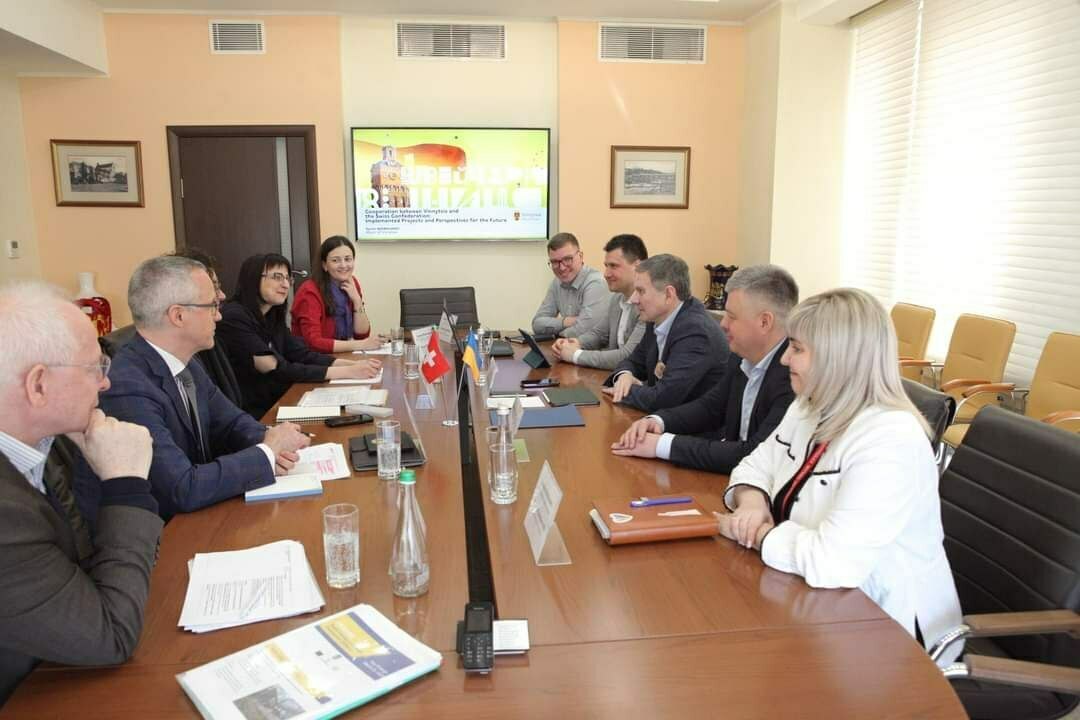
Swiss delegation at a meeting with Serhii Morhunov, Mayor of Vinnytsia
The return of Ukrainians home
The recovery of municipalities as communities is just as important as the restoration of their physical spaces. Therefore, the Swiss government delegation, together with representatives of civil society, discussed the possible steps necessary for the return of people to their municipalities and their healing from the traumatic experiences of the war. By the beginning of 2023, according to the UN, the number of refugees in European countries amounted to almost 8 million people. Another 5 million persons have been internally displaced. In this context, the special focus was on how Ukraine can rely on the success of decentralisation in the restoration of territories, in creating a safe environment for living and conditions for the self-actualisation of people who have returned home. As was stressed by the representatives of Switzerland, the involvement of all stakeholders in this process, including representatives of civil society, will strengthen trust between society and state institutions, which, in turn, will contribute to the recovery.
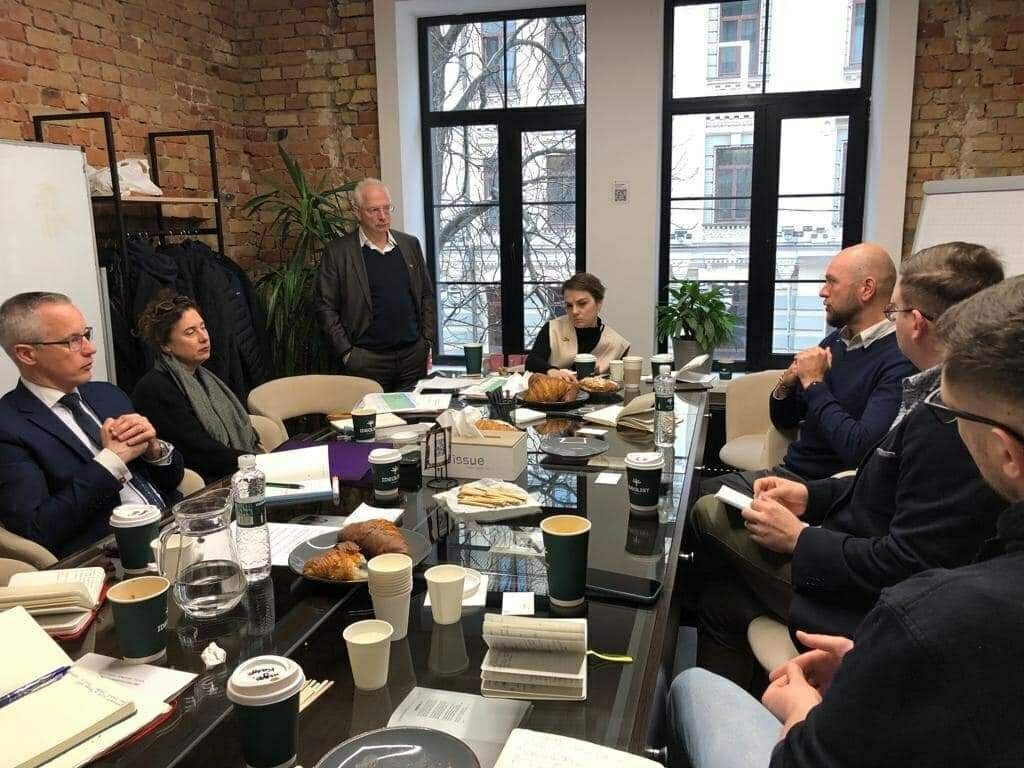
Meeting with representatives of civil society
Security and humanitarian issues of the Kharkiv region
The meeting of Ambassador Simon Geissbühler with Oleh Syniehubov, Head of the Kharkiv Regional Military Administration, concerned the security situation in the region and issues of humanitarian aid.
The parties focused on the key aspects of the needs of the Kharkiv region in the conditions of war. According to the head of the Kharkiv Regional Military Administration, the residents of the region are primarily in need of food and monetary aid. Hospitals need medical equipment. The region also has a shortage of power-generating equipment, because the enemy continues to attack the critical infrastructure of the regional capital as well as municipalities.
The delegation of the Federal Department of Foreign Affairs of Switzerland expressed its readiness to cooperate with the Kharkiv region, intensifying steps to provide humanitarian support to the region and implement other tasks that would contribute to the improvement of the living conditions of the population.
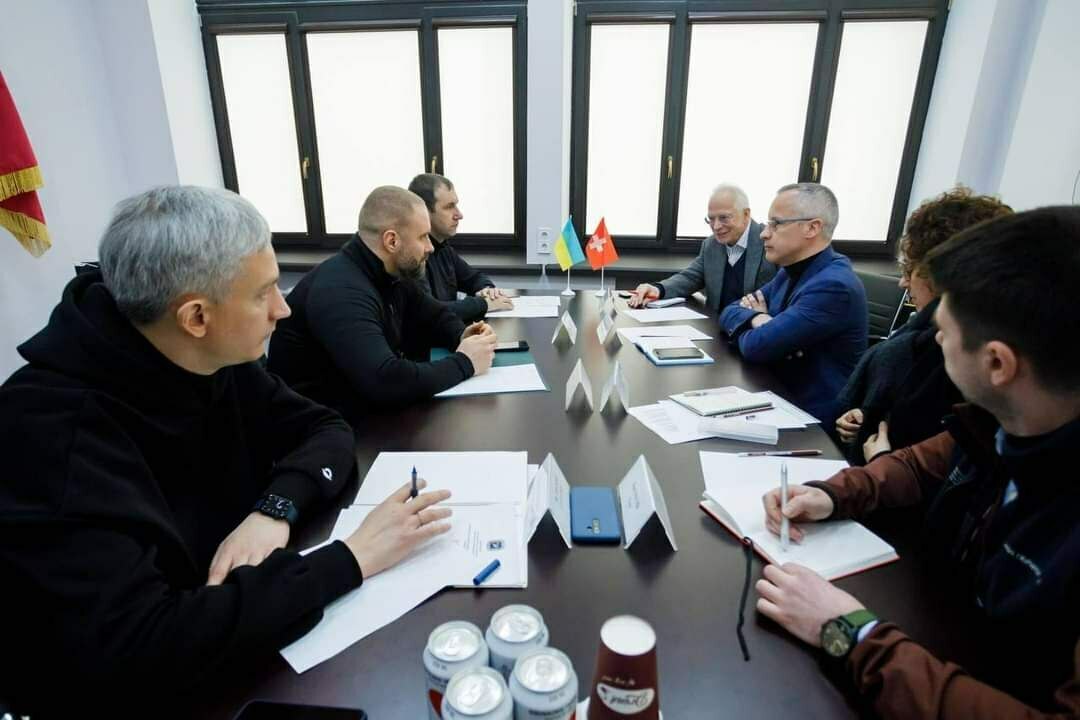
Meeting of Ambassador Simon Geissbühler with Oleh Syniehubov, Head of the Kharkiv Regional Military Administration
Following the Swiss delegation’s visit to Ukraine, we can conclude that Switzerland stands out for its unique accuracy. And it is not about watches. This is about areas that are extremely important for Ukraine, on which the partner country puts a strong emphasis. This is about timely support. Ultimately, this is about the humanity and solidarity that Switzerland shows to the people of Ukraine.
